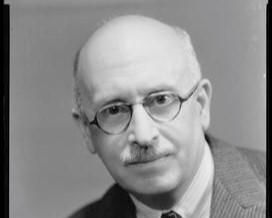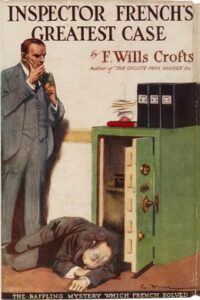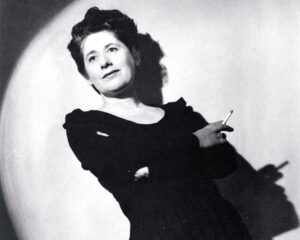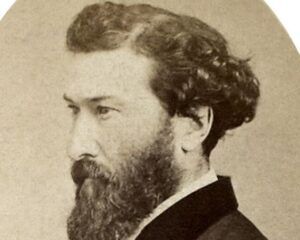Freeman Wills Crofts: The Master of the Methodical Detective Story
admin September 15, 2024 0
NPG x156449; Freeman Wills Crofts
Freeman Wills Crofts may not be the most widely recognised name in detective fiction, but for those familiar with the Golden Age of the genre, he is regarded as a master of the meticulously crafted puzzle. Often called the “father of the police procedural,” Crofts was known for his methodical approach to detective work, detailed plotting, and an emphasis on realism. His novels, which feature the tireless and diligent Inspector Joseph French, helped to shape the way detective fiction portrayed police investigations and influenced many subsequent writers.
While other Golden Age authors, like Agatha Christie, leaned toward dramatic reveals and eccentric sleuths, Crofts took a different route, focusing on the slow, painstaking work of solving crimes. His stories were less about the brilliance of an individual detective and more about the grind of logical reasoning and methodical police work. So, who was the man behind these intricately plotted mysteries, and why does his work still resonate with fans of classic crime fiction today?
Early Life: From Engineering to Mystery Writing
Freeman Wills Crofts was born on 1 June 1879 in Dublin, Ireland, into a middle-class family. He came from a background that was far removed from the world of literature – his father, William Crofts, was a physician, and his mother, Celia, hailed from a family of clergy. Sadly, Crofts’ father passed away before he was born, and he was raised primarily by his mother.
Initially, it didn’t seem that Crofts would follow a literary path. He trained as a civil engineer and spent much of his early career working for the railways, an experience that would later play a key role in his writing. His deep understanding of timetables, mechanical engineering, and railway systems added an extraordinary layer of authenticity to his crime novels, where the smallest detail about a train schedule could be the key to solving a case.
Crofts’ shift to writing was somewhat accidental. In 1919, while recovering from a long illness, he began writing his first novel, The Cask (1920). The book was an immediate success, praised for its meticulous plotting and attention to detail. Crofts quickly realised that his engineering background could be put to good use in crafting mysteries, and he continued to write prolifically, producing a steady stream of novels throughout his career.
The Rise of Inspector Joseph French
If Crofts is best known for anything, it’s his creation of Inspector Joseph French. Introduced in Inspector French’s Greatest Case (1924), French was a departure from the brilliant but eccentric detectives popular in the genre at the time. Where Sherlock Holmes or Hercule Poirot relied on flashes of insight or intuitive leaps, French was methodical, diligent, and thorough. He wasn’t a genius – just a hard-working, highly skilled police officer who followed the evidence wherever it led.

Crofts’ Inspector French stories often involved painstaking investigations that required the detective to meticulously check alibis, follow train schedules, and slowly piece together the puzzle. There was rarely a dramatic “eureka” moment in these stories – instead, French would gradually eliminate possibilities until the only conclusion left was the correct one. His approach mirrored the real-life methods of police work more closely than many of Crofts’ contemporaries, and it’s one of the reasons his work is often credited with laying the foundation for the modern police procedural genre.
What set Crofts apart from other Golden Age writers was his focus on logic and realism. In his novels, every clue made sense, and the solution to the mystery was always based on careful reasoning rather than a last-minute revelation. Crofts’ background as an engineer undoubtedly influenced this approach – his stories often felt like puzzles that needed to be solved piece by piece, with each part fitting neatly into place.
The Timetable Mystery: A Freeman Wills Crofts Trademark
One of the hallmarks of Crofts’ novels was the use of complex timetables, particularly those involving trains. His early career in engineering and his work with railways gave him a deep understanding of timetables, logistics, and scheduling, which became central elements in many of his stories. In novels like The 12:30 from Croydon (1934) and The Hog’s Back Mystery (1933), precise timing is crucial to solving the crime.
In The 12:30 from Croydon, for instance, the entire plot revolves around the murder of a businessman aboard a flight from Croydon to Paris. As the narrative unfolds, it becomes clear that the timing of events is key to understanding how the crime was committed. Crofts relished the challenge of creating stories where the smallest detail – whether it was a train arriving a minute early or a car leaving at exactly the right time – could make or break the case.
This emphasis on timing and logistics made Crofts’ novels feel grounded in reality. He wasn’t interested in creating outlandish or improbable scenarios; his mysteries were rooted in the everyday workings of society – transport, communication, and technology. For readers, this attention to detail added a level of intellectual engagement that many found deeply satisfying.
A Pioneer of the Police Procedural
While Crofts is often grouped with the writers of the Golden Age of Detective Fiction, such as Agatha Christie, Dorothy L. Sayers, and Margery Allingham, his approach to crime fiction was distinct. He was less concerned with the “whodunnit” aspect and more focused on the “how” and “why” behind the crime. His Inspector French novels provided a realistic depiction of police work, showing the often slow, grinding process of an investigation.
In this way, Crofts can be seen as one of the pioneers of the police procedural subgenre, which would later be popularised by writers like Ed McBain and P.D. James. Crofts showed that the process of solving a crime could be just as compelling as the solution itself. His novels highlighted the importance of teamwork, with French often relying on other officers or specialists to help crack the case. This collaborative aspect of police work was something that had rarely been portrayed in detective fiction before Crofts, and it’s one of the reasons his work stands out from that of his contemporaries.
The Legacy of Freeman Wills Crofts
Although Crofts may not enjoy the same level of name recognition as Agatha Christie or Arthur Conan Doyle, his impact on the genre is undeniable. His focus on realism, methodical investigation, and the use of timetables influenced a generation of writers, both in the UK and beyond. Authors like Raymond Chandler, who admired Crofts’ meticulous plotting, were inspired by his work, and his emphasis on logic and careful reasoning paved the way for the police procedural genre as we know it today.
Freeman Wills Crofts continued to write until his death in 1957, producing more than 30 novels, along with numerous short stories and radio plays. His later works, while perhaps not as widely read as those of Christie or Sayers, remain beloved by fans of classic detective fiction for their precision and attention to detail.
Crofts’ ability to weave complex, engaging plots without resorting to gimmicks or improbable twists makes his work a fascinating study for fans of the genre. His novels are intellectual puzzles, where every clue matters, and the satisfaction comes not just from uncovering the culprit, but from understanding exactly how the crime was committed.
The Enduring Appeal of a Master Craftsman
Freeman Wills Crofts might not have been the most flamboyant or dramatic writer of detective fiction, but he was one of the most meticulous. His novels, with their careful attention to detail and emphasis on logic, continue to stand as examples of how satisfying a well-crafted mystery can be. Inspector French, with his dogged determination and methodical approach, remains one of the most relatable and realistic detectives in the genre.
For readers who enjoy the intellectual challenge of piecing together a mystery, Crofts’ novels offer a rewarding experience. His stories don’t rely on flashy tricks or shocking twists – instead, they unfold gradually, with each clue carefully laid out for the reader to follow. It’s no wonder that Crofts’ work is still enjoyed by crime fiction enthusiasts today, over a century after he first introduced Inspector French to the world.
Freeman Wills Crofts may not have sought the limelight, but his contributions to detective fiction are undeniable. His work remains a testament to the power of careful plotting, realistic detail, and methodical investigation – qualities that have influenced countless writers and continue to delight readers around the world.


